Languages: Promoting a love of languages
One of the MFL department’s aims this current academic year is to promote a love of language learning and for students to have an opportunity to use and improve their language skills in a non-classroom context. We have, therefore, set about expanding our extra-curricular offering to complement classroom learning and to engage and inspire students with language learning. Earlier in the Spring Term, we invited the Onatti theatre company to perform to our Year 9 German students. The play ‘auf dem Campingplatz’ was well-received by students and produced quite a few laughs as students themselves had the opportunity to participate on stage. Many felt that the fact they were able to follow the play in a foreign language gave them the confidence they needed to continue language learning. Such was the success of this performance, Onatti will return to Queen Elizabeth’s later in the school year to perform to our Year 8 students.
This year has also seen the introduction of a Languages Games Club where students from across the school can come and participate in games in French, German and Latin. We are hoping that this will become a well-established fixture in the school extracurricular calendar as it has proved a hit with our students. They have much enjoyed Scrabble in French, card games in German and word games in Latin. It has been particularly pleasing to see students give up their free time to join the club. We feel this bodes well for our aim of promoting a love of languages.
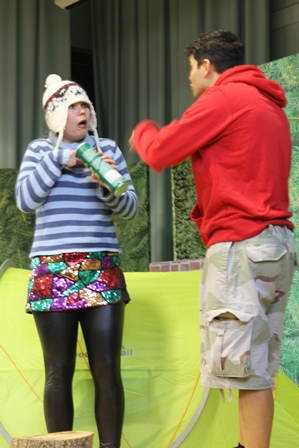
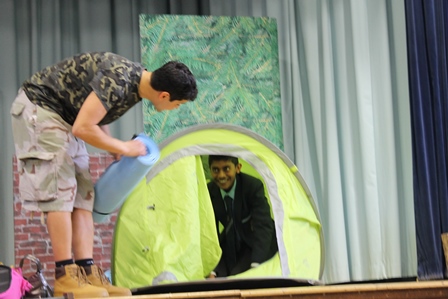
History: Lifting the veil on complex, beautiful Russia
The History department has been broadening pupils’ knowledge and bringing history to life with more excursions to places of historical interest, and allowing them to get their hands on some original artefacts. One recent trip saw Queen Elizabeth’s School Sixth Form students visiting Russia where they witnessed the dead hand of communism on a trip to Moscow and St Petersburg – but also savoured the architectural splendour of Russia’s imperial past. The trip involved historians from Years 12 and 13, who study Russia from the Communist takeover in 1917 to the death of Stalin in 1953.
Head of History, Helen MacGregor, recalled the striking start of their first full day in Moscow: “We got to see Lenin – who died in 1924! – in his mausoleum. It was amazing to see someone preserved who was so instrumental in world history, creating the first communist country. They paint Lenin with a secret formula once a week to stop him rotting, except that one hand wasn’t done in time and he therefore has black fingers.”
The 27 boys also visited the Kremlin – an historic fortress as well as the base of the current president, Vladimir Putin – and the nearby grave of Stalin. Miss MacGregor noted that the group’s Russian tour guides were great admirers of Putin.
After two full days in Moscow the pupils took the famous night train to St Petersburg, which boasted four-berth cabins, toasted sandwiches and even wi-fi! There they saw the magnificence of Tsarist Russia, with its huge palaces, beautiful gold decorations – including an entire room made out of amber in the Summer Palace – which formed a sharp contrast with the Soviet-era architecture of Moscow. Pupil Conor Mellon said: “The trip enriched the perspective of the country that I had from my History lessons: walking through the Winter Palace 99 years to the day from the October Revolution was particularly cool.”
On their return, the boys reflected on a trip that was enjoyable and, at times, sobering too: Erik Lam recalled the “breathtaking and inexplicably beautiful landmarks” and the “deathly silence of Lenin’s mausoleum”. He added: “For me, the guided tour of the Gulag museum was one of great value as not only were we confronted by the dark and unfortunate history of the Gulags in Russia, but also we were given an insight into the life and opinion of a person living in modern Russia; it lifted the veil on the mysterious and biased portrayal of Russia by Western media.”
English: Creating a reading 'tube map'
Inspired by an idea shared at the PTI subject day in July 2014, a milestone for the English Department was to work in collaboration with our School Librarian to stimulate new and innovative ways in which to encourage reading. After collating ideas from Key Stage 3, we worked with Year 12 pupil Hersh Kataria, the School Librarian and one of the Art teachers to see what we could create.
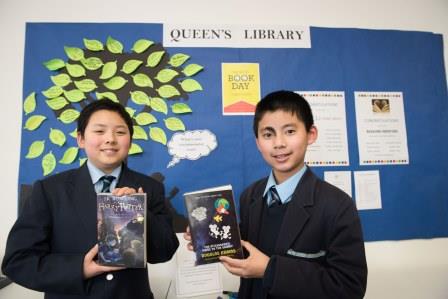 Our ideas resulted in our working towards the creation of our own version of the London Tube Map, replacing station names with text recommendations and genres we thought the students would enjoy. We researched similar creative ideas on the internet and then made our own map specific to the texts available in the School Library and according to genres we believed to be the students’ preferences. As part of their creative writing club, Year 11 pupils Prashan Balendran and Roshan Shah researched popular texts by surveying form groups across Key Stage 3, and we also asked Year 7 and Year 8 English classes to share their favourite authors. Together with the help of our Librarian and the Art department, we began by using a tube map template and started planning out different routes, being careful to get the cross-overs between genres as accurate as we could. We also tried, where possible, to keep it geographically accurate, keeping The London Eye Mysteries on the South Bank and The Sherlock Holmes tales based around Baker Street. Hersh Kataria then used his computer skills to adapt and modify the map and after lots of tweaks and amendments we finally completed it six months later!
Our ideas resulted in our working towards the creation of our own version of the London Tube Map, replacing station names with text recommendations and genres we thought the students would enjoy. We researched similar creative ideas on the internet and then made our own map specific to the texts available in the School Library and according to genres we believed to be the students’ preferences. As part of their creative writing club, Year 11 pupils Prashan Balendran and Roshan Shah researched popular texts by surveying form groups across Key Stage 3, and we also asked Year 7 and Year 8 English classes to share their favourite authors. Together with the help of our Librarian and the Art department, we began by using a tube map template and started planning out different routes, being careful to get the cross-overs between genres as accurate as we could. We also tried, where possible, to keep it geographically accurate, keeping The London Eye Mysteries on the South Bank and The Sherlock Holmes tales based around Baker Street. Hersh Kataria then used his computer skills to adapt and modify the map and after lots of tweaks and amendments we finally completed it six months later!
This project proved to be a very valuable cross-curricular experience and involved many different ideas and skills. We hope it will provide an interesting way for the students to enjoy exploring their reading choices; not only can they share their favourite authors using their own personalised tube line (on a paper copy in their exercise books), but they can also start thinking more carefully about the links that connect the different genres of texts they choose.
Geography: Developing a global perspective
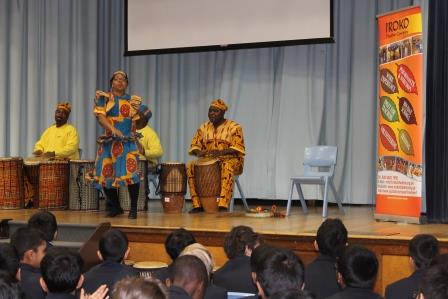 The title of our current project in the Geography Department is “How can schools in different contexts be used to challenge and develop student’s perceptions of key global issues?”
The title of our current project in the Geography Department is “How can schools in different contexts be used to challenge and develop student’s perceptions of key global issues?”
The most important part of this development was our establishing links with a school in Ghana. Once established, new projects on related topics such as fair trade and water resources were set up, with students at both schools completing similar projects. A teacher from Ghana also visited our school in December 2014, with funding from the British Council’s Connecting Classroom programme. The visiting teacher observed lessons, met with staff, attended our annual Carol Service in the local church, gave a presentation and met students of the school ‘Interlinked’ club. The visit helped teachers and pupils from the two schools learn about their respective ways of life, as well as finding out more about different approaches to teaching and learning.
As well as the curriculum projects and visit, the perceptions of key global issues were explored through a workshop, delivered by an African-style theatre company, ‘Iroko’, who shared in a very vivid way their knowledge of African spirituality, beliefs and culture. Via songs, stories and a mass-participation drumming workshop, the members of Iroko brought African culture to life in joyful music-making and also by sharing poignant stories of the hardship that can also exist in African life.
All of this work has helped to develop a greater sense of interest in the rest of the world and an increased awareness of global issues. Students have also said that knowing their work was being shared with students in Ghana and that they were doing the same projects really did inspire them to produce a better quality of work and made them enjoy it more.
Mathematics: Cross-curricular investigations
To help achieve some of the objectives of the PTI programme, two exciting developments have occurred in the Mathematics department.
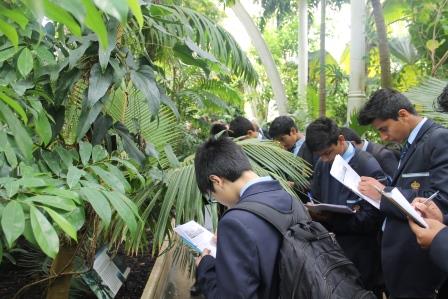 40 pupils from Year 9 went on a cross-curricular Mathematics and Biology trip to Kew Gardens. They investigated trigonometry in real life settings and used it to find the heights of trees. They plotted the heights of their trees against the circumferences and used principles from Biology to explain the patterns they saw. They later found out about uses of plants and adaptation in plants including carnivorous plants such as the Venus fly trap. This setting also enabled us to see the Fibonacci sequence in nature such as spirals in pine cones and sunflowers, and to conduct a frequency analysis to test whether Fibonacci numbers are more common than other numbers in nature. When back at School, pupils investigated the ‘golden ratio’ and made posters explaining their findings. The video footage of the day will be shared with the other students as an educational resource for the summer GCSE exams.
40 pupils from Year 9 went on a cross-curricular Mathematics and Biology trip to Kew Gardens. They investigated trigonometry in real life settings and used it to find the heights of trees. They plotted the heights of their trees against the circumferences and used principles from Biology to explain the patterns they saw. They later found out about uses of plants and adaptation in plants including carnivorous plants such as the Venus fly trap. This setting also enabled us to see the Fibonacci sequence in nature such as spirals in pine cones and sunflowers, and to conduct a frequency analysis to test whether Fibonacci numbers are more common than other numbers in nature. When back at School, pupils investigated the ‘golden ratio’ and made posters explaining their findings. The video footage of the day will be shared with the other students as an educational resource for the summer GCSE exams.
Secondly, ‘elite maths’ has been set up as an extra-curricular opportunity for aspiring Mathematicians from Year 8 upwards. Students in older year groups mentor students in younger key stages to solve challenging puzzles and help prepare them for success in the UK Mathematics Trust team challenges, and the UK Mathematics Trust Olympiad and the Hans Woyda Mathematics competition.
Music: Competition success!
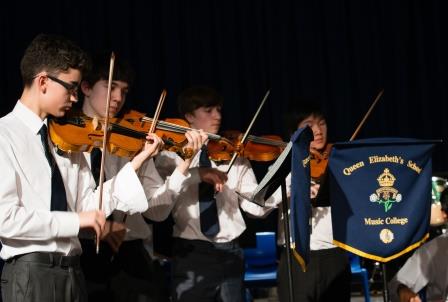 The Music department’s objectives for the 2014/15 PTI Schools Programme saw pupils taking part in local and national performance and composition competitions, both as soloists and in ensembles, in order to augment their musical experience. This initiative also served to measure our pupils’ progression and standard against pupils at other schools.
The Music department’s objectives for the 2014/15 PTI Schools Programme saw pupils taking part in local and national performance and composition competitions, both as soloists and in ensembles, in order to augment their musical experience. This initiative also served to measure our pupils’ progression and standard against pupils at other schools.
One student entered a composition competition for the BBC Radio 3 Christmas Carol Competition, although he was not successful in getting an award. The same student entered a composition for another competition resulting in a live performance at St. John’s Smith Square to celebrate the Commonwealth. We had considerable success at the Spring Grove Festival in Hampstead, a competition open to musical ensembles with members aged between 11 and 18 years old. Five ensembles took part in a variety of Senior and Intermediate, Popular and Classical categories. Three of our ensembles reached the final of the Senior Popular category, with the Senior Saxophone Ensemble winning the class, beating ensembles from other local schools and music centres. Another student won the composition category, beating pupils from a number of other schools and two other of our composers who were also shortlisted for the final.
A number of boys took part in the North London Festival of Music, Drama and Dance and the Watford Festival, winning in various categories including the U14 Piano class at the latter.
Science: Nurturing intrinsic curiosity
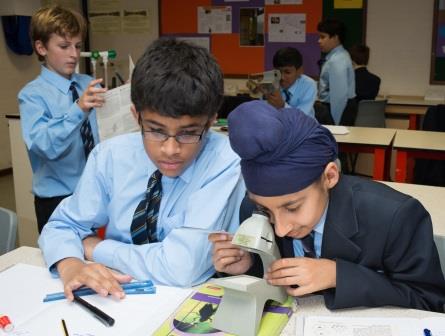 During 2014-2015, the Science department worked toward Associate membership of the PTI by completing a research project. This project focused on Lower School Science with the aim of nurturing the intrinsic curiosity for scientific enquiry which students display when entering Year 7 but which can be constrained by a solely fact-based curriculum. Development of Lower School Science provision has seen a revamped curriculum launched with an increased focus on practical skills. A greater percentage of the taught course is dedicated to pupils planning and evaluating their own practical work, drawing links between the taught curriculum and their observations. Alongside these curriculum developments has been an overhaul of the assessment techniques used both by teachers and the pupils during formative evaluation and self-assessment.
During 2014-2015, the Science department worked toward Associate membership of the PTI by completing a research project. This project focused on Lower School Science with the aim of nurturing the intrinsic curiosity for scientific enquiry which students display when entering Year 7 but which can be constrained by a solely fact-based curriculum. Development of Lower School Science provision has seen a revamped curriculum launched with an increased focus on practical skills. A greater percentage of the taught course is dedicated to pupils planning and evaluating their own practical work, drawing links between the taught curriculum and their observations. Alongside these curriculum developments has been an overhaul of the assessment techniques used both by teachers and the pupils during formative evaluation and self-assessment.
Drawing on the work of Pam Hook, SOLO (Structure of Observed Learning Outcomes) taxonomy has been incorporated throughout the new curriculum, placing the onus on students to evaluate and justify their ideas when giving an answer, moving away from exam-based regurgitation of facts. Students are encouraged to critique their own and each other’s answers using the SOLO hierarchy of thinking skills, and teachers assess homework tasks using these criteria. Moving away from a purely level-based system of assessment has allowed more freedom in the setting of independent research tasks and encouraged students to engage more productively with teacher feedback. Student response is at the heart of this dialogic approach to feedback, giving rise to a greater student appreciation of the steps they need to take to improve their work.
Queen Elizabeth's School is a state school for boys aged 11-18, based in Barnet.
